Financial System Adaptability and Resilience
This research group investigates critical aspects of financial system adaptability and resilience. First, it analyses the impact of natural disasters on financial systems. Second, the group aims to investigate the effects of political preferences for the green transition. Third, the group's research analyses the role of culture in economies.
Research Cluster
Financial Resilience and RegulationYour contact

- Department Financial Markets
EXTERNAL FUNDING
08.2022 ‐ 07.2025
OVERHANG: Debt overhang and green investments - the role of banks in climate-friendly management of emission-intensive fixed assets
The collaborative project “Debt Overhang and Green Investments” (OVERHANG) aims to investigate the role of banks in the climate-friendly management of emission-intensive fixed assets. This will identify policy-relevant insights on financial regulation, government-controlled lending and financial stability, as well as raise awareness among indebted stakeholders.
01.2015 ‐ 12.2019
Interactions between Bank-specific Risk and Macroeconomic Performance
07.2016 ‐ 12.2018
Relationship Lenders and Unorthodox Monetary Policy: Investment, Employment, and Resource Reallocation Effects
We combine a number of unique and proprietary data sources to measure the impact of relationship lenders and unconventional monetary policy during and after the European sovereign debt crisis on the real economy. Establishing systematic links between different research data centers (Forschungsdatenzentren, FDZ) and central banks with detailed micro-level information on both financial and real activity is the stand-alone proposition of our proposal. The main objective is to permit the identification of causal effects, or their absence, regarding which policies were conducive to mitigate financial shocks and stimulate real economic activities, such as employment, investment, or the closure of plants.
Refereed Publications
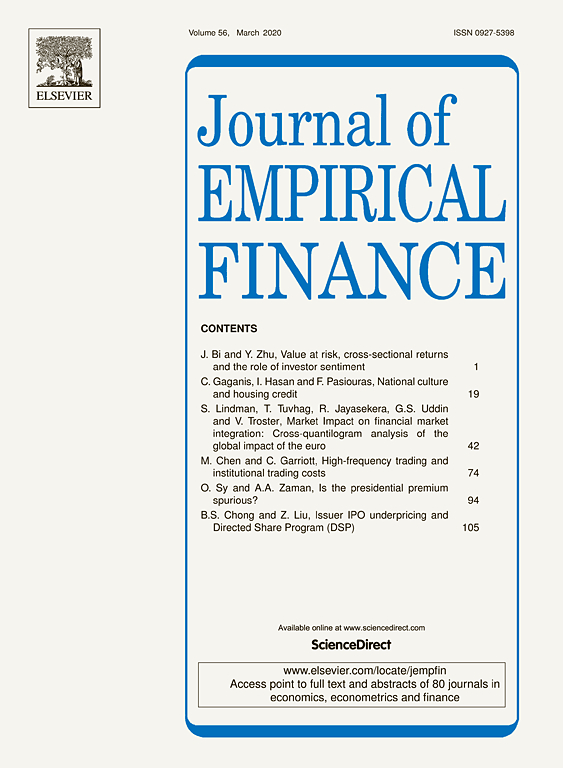
Income, Trading, and Performance: Evidence from Retail Investors
in: Journal of Empirical Finance, March 2022
Abstract
We examine whether household income influences the trading styles of retail investors and their investment performance. To investigate this question, we use a unique dataset of branch-level trading that contains all retail investors and observe that those investors with high income trade more and earn significantly higher returns in the stock market. In addition, this income effect becomes stronger for highly risky stocks, such as gambling or lottery-like stocks. These findings are in line with the information model theorized by Peress (2004) in which wealthy investors take extra risks by trading more stocks.

Banking Reform, Risk-Taking, and Accounting Quality: Evidence from Post-Soviet Transition States
in: Journal of International Accounting Research, No. 1, 2022
Abstract
The drastic banking reform within Central and Eastern Europe following the collapse of the Soviet Union provides an ideal quasi-experimental design to examine the causal effects of institutional development on accounting quality (AQ). We find that banking reform spurs significant improvement in predictive power of earnings and reductions in earnings smoothing, earnings-inflating discretionary provisions, and avoidance of reporting losses. These effects hold under alternative model specifications and after considering concurrent institutional developments. In contrast, corporate reform shows no such effects, refuting the alternative explanation that unobserved factors affect both reform speed in general and the quality of financial reporting. We further identify four specific reformative actions that are integral to the drastic banking reform process where prudential regulation contributes the most to the observed AQ improvement. It supports the conjecture that banking reform improves AQ by reducing banks' risk-taking behaviors and, as a result, their motive behind accounting manipulation.

Understanding Climate Activism: Who Participates in Climate Marches Such As “Fridays for Future” and What Can We Learn from It?
in: Energy Research and Social Science, February 2022
Abstract
Young people are marching around the globe to ask for measures against climate change and to protect the environment. Using novel survey data, we ask who participates in such powerful movements and what can be learned from our findings. The survey was conducted in German and is based on answers from more than 600 participants. We find that survey respondents are less likely to participate in climate marches like “Fridays for Future” in case they trust more in (large) corporations suggesting a link between trust and climate activism. We also ask whether worries about climate change or attitudes towards more environmentally friendly behavior match their participation frequency in climate marches. Results reveal that respondents being more worried about climate change or the environment tend to participate more often in marches addressing these concerns. Similarly, participation in climate marches correlates positively with acting environmentally sustainable. Hence, our findings might be relevant for corporations in case they want to keep the support of young customers participating in climate marches.
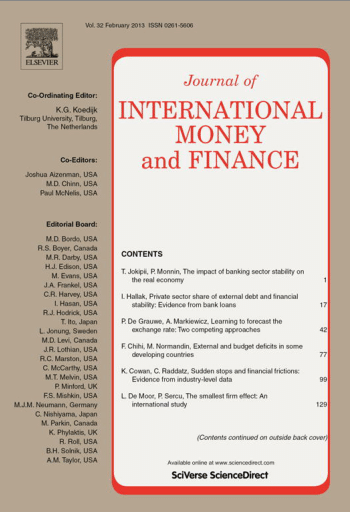
The Diplomacy Discount in Global Syndicated Loans
in: Journal of International Money and Finance, February 2022
Abstract
This paper investigates whether state-to-state political ties with the United States affect the pricing of global syndicated loans. We find that a one-standard-deviation improvement in state political ties between the U.S. and the government of a borrower’s home country is associated with a 14.7 basis points lower loan spread, shaving off about 11.8 million USD in interest payments over the duration of the average loan for borrowers. Results also show that the effect of political ties is stronger for narrower and more concentrated loan syndicates, when lead arrangers are U.S. banks, during periods in which the U.S. is engaged in armed conflicts, when the U.S. president belongs to the Republican Party, and for borrowers with better balance sheets and prior lending relationships. Notably, not all firms benefit equally, as cross-listed firms and firms in countries with strong institutional quality and ability to attract institutional investors are much less affected by political ties.

Do Banks Value Borrowers' Environmental Record? Evidence from Financial Contracts
in: Journal of Business Ethics, December 2021
Abstract
Banks play a unique role in society. They not only maximize profits but also consider the interests of stakeholders. We investigate whether banks consider firms’ pollution records in their lending decisions. The evidence shows that banks offer significantly higher loan spreads, higher total borrowing costs, shorter loan maturities, and greater collateral to firms with higher levels of chemical pollution. The costly effects are stronger for borrowers with greater risk and weaker corporate governance. Further, the results show that banks with higher social responsibility account for their borrowers’ environmental performance and charge higher loan spreads to those with poor performance. These results support the idea that banks with higher social responsibility can promote the practice of business ethics in firms.
Working Papers

Covered Bonds and Bank Portfolio Rebalancing
in: Norges Bank Working Papers, No. 6, 2021
Abstract
We use administrative and supervisory data at the bank and loan level to investigate the impact of the introduction of covered bonds on the composition of bank balance sheets and bank risk. Covered bonds, despite being collateralized by mortgages, lead to a shift in bank lending from mortgages to corporate loans. Young and low-rated firms in particular receive more credit, suggesting that overall credit risk increases. At the same time, we find that total balance sheet liquidity increases. We identify the channel in a theoretical model and provide empirical evidence: Banks with low initial liquidity and banks with sufficiently high risk-adjusted return on firm lending drive the results.

Cultural Resilience, Religion, and Economic Recovery: Evidence from the 2005 Hurricane Season
in: IWH Discussion Papers, No. 9, 2021
Abstract
This paper investigates the critical role of religion in the economic recovery after high-impact natural disasters. Exploiting the 2005 hurricane season in the southeast United States, we document that establishments in counties with higher religious adherence rates saw a significantly stronger recovery in terms of productivity for 2005-2010. Our results further suggest that a particular religious denomination does not drive the effect. We observe that different aspects of religion, such as adherence, shared experiences from ancestors, and institutionalised features, all drive the effect on recovery. Our results matter since they underline the importance of cultural characteristics like religion during and after economic crises.
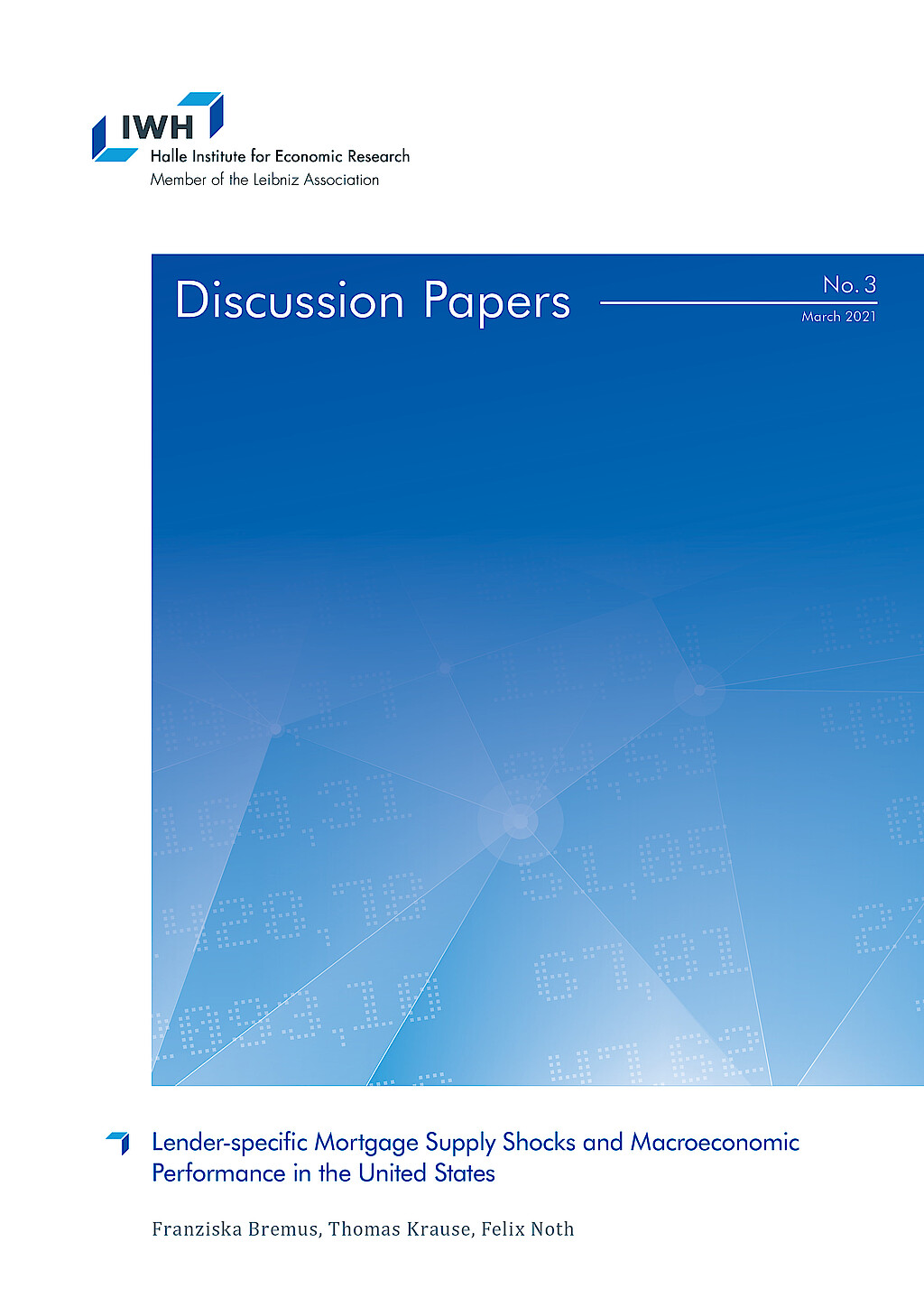
Lender-specific Mortgage Supply Shocks and Macroeconomic Performance in the United States
in: IWH Discussion Papers, No. 3, 2021
Abstract
This paper provides evidence for the propagation of idiosyncratic mortgage supply shocks to the macroeconomy. Based on micro-level data from the Home Mortgage Disclosure Act for the 1990-2016 period, our results suggest that lender-specific mortgage supply shocks affect aggregate mortgage, house price, and employment dynamics at the regional level. The larger the idiosyncratic shocks to newly issued mortgages, the stronger are mortgage, house price, and employment growth. While shocks at the level of shadow banks significantly affect mortgage and house price dynamics, too, they do not matter much for employment.
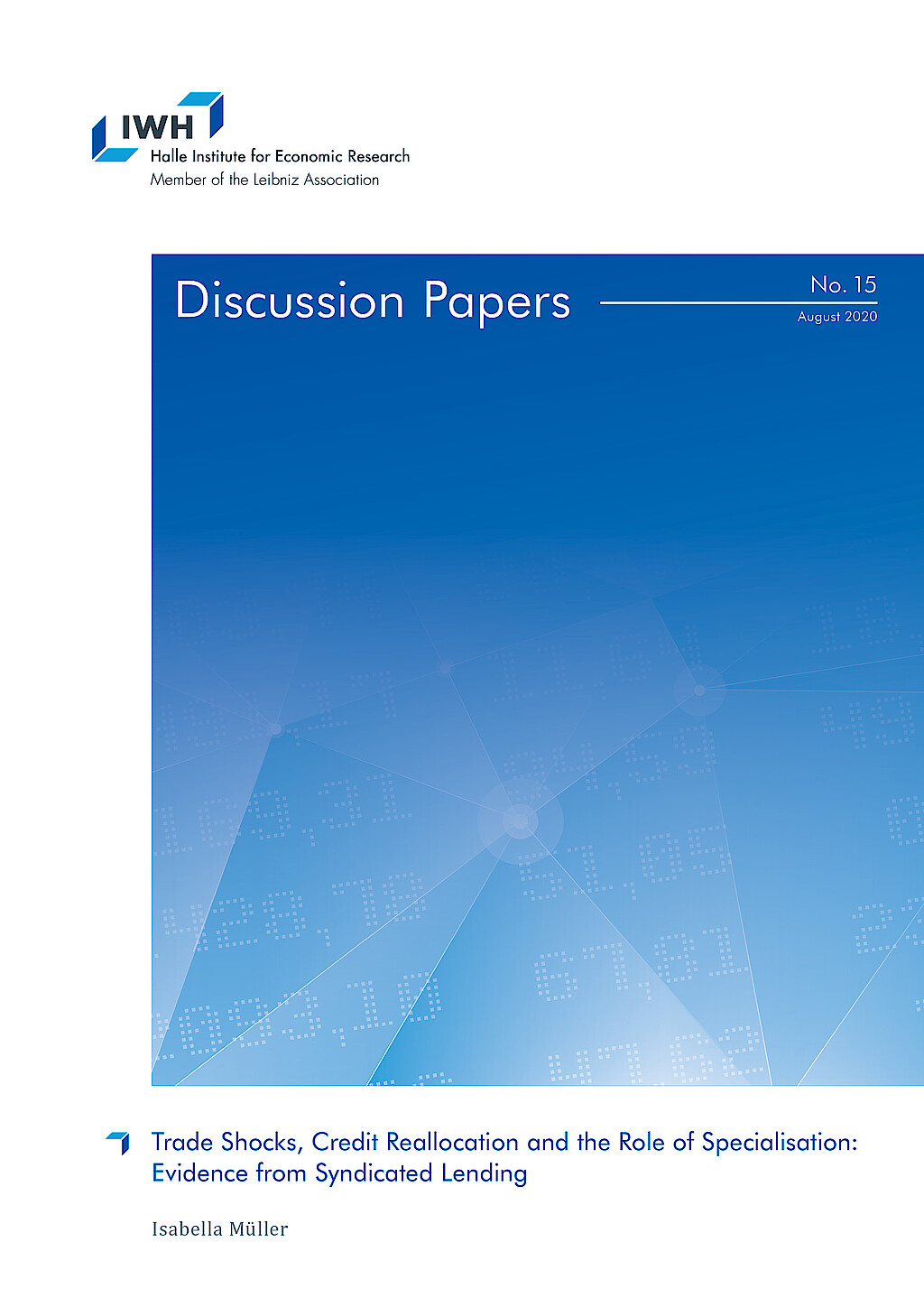
Trade Shocks, Credit Reallocation and the Role of Specialisation: Evidence from Syndicated Lending
in: IWH Discussion Papers, No. 15, 2020
Abstract
This paper provides evidence that banks cut lending to US borrowers as a consequence of a trade shock. This adverse reaction is stronger for banks with higher ex-ante lending to US industries hit by the trade shock. Importantly, I document large heterogeneity in banks‘ reaction depending on their sectoral specialisation. Banks shield industries in which they are specialised in and at the same time reduce the availability of credit to industries they are not specialised in. The latter is driven by low-capital banks and lending to firms that are themselves hit by the trade shock. Banks‘ adjustments have adverse real effects.
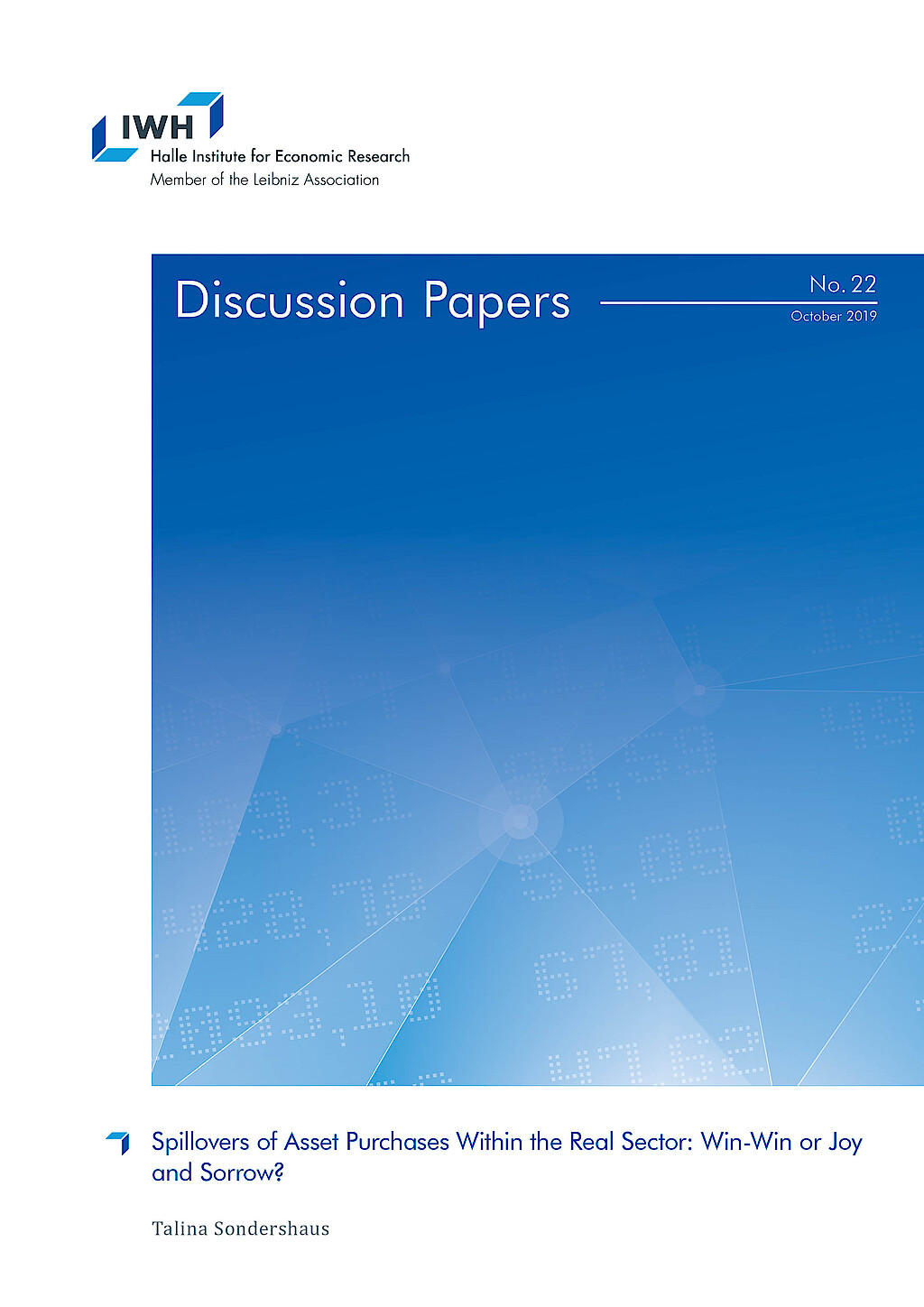
Spillovers of Asset Purchases Within the Real Sector: Win-Win or Joy and Sorrow?
in: IWH Discussion Papers, No. 22, 2019
Abstract
Events which have an adverse or positive effect on some firms can disseminate through the economy to firms which are not directly affected. By exploiting the first large sovereign bond purchase programme of the ECB, this paper investigates whether more lending to some firms spill over to firms in the surroundings of direct beneficiaries. Firms operating in the same industry and region invest less and reduce employment. The paper shows the importance to consider spillover effects when assessing unconventional monetary policies: Differences between treatment and control groups can be entirely attributed to negative effects on the control group.



















